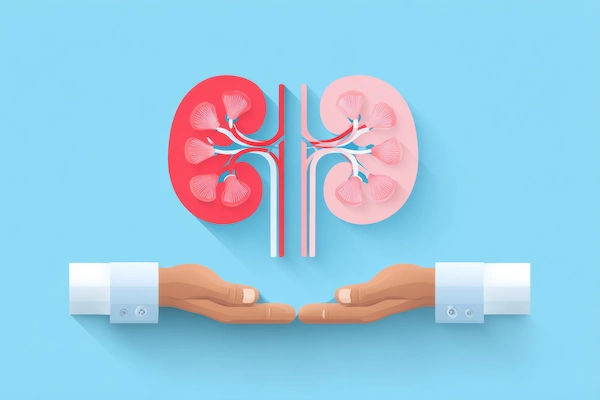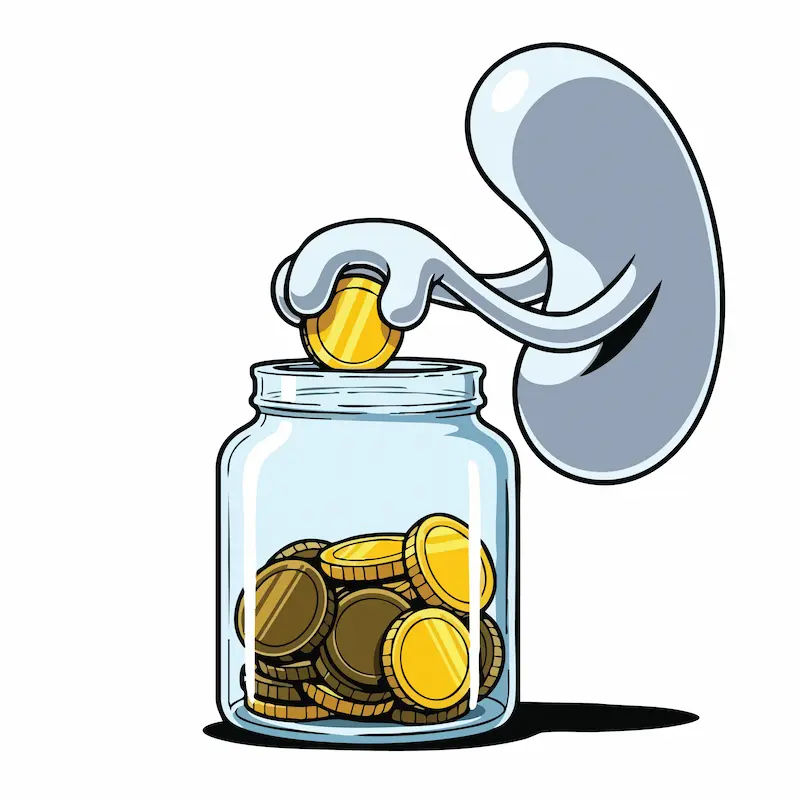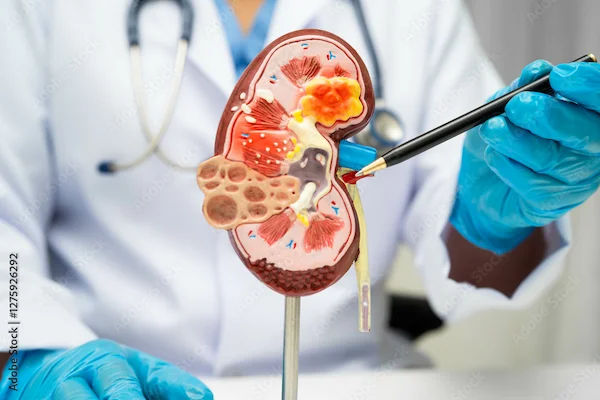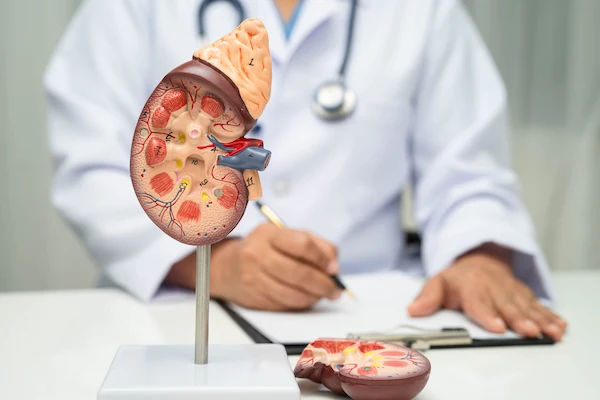How Long Is A Kidney Good For Transplant After Death?
How long can a deceased donor kidney be preserved for transplant? Learn about the typical 24-36 hour viability window and the vital role of cold preservation in successful kidney transplantation.

Written by
Last updated on 13th Jan, 2026
_1.webp?tr=q-80,f-webp,w-350,dpr-2,c-at_max 700w)
Introduction
Kidney transplantation is a lifesaving procedure for patients with end-stage kidney disease. One of the most common questions people have is: How long can a kidney remain viable for transplant after a donor’s death? Understanding this is crucial for patients, families, and healthcare providers involved in organ donation.
Understanding Kidney Transplant from a Deceased Donor
When a person donates a kidney after death (deceased donation), the organ must be preserved and transplanted within a specific timeframe to remain functional. The viability of the kidney depends on several factors, including:
1. Time Between Death and Organ Recovery – The sooner the kidney is recovered after death, the better its chances of functioning well.
2. Preservation Method – Kidneys are stored in a special cold solution to slow down tissue damage.
3. Transportation Time – The kidney must reach the recipient quickly to minimize damage.
How Long Can a Kidney Stay Viable After Death?
Under ideal conditions, a kidney from a deceased donor can remain viable for 24 to 36 hours after removal from the donor’s body. However, the sooner it is transplanted, the better the outcome. Here’s a breakdown:
Cold Storage Time:
Standard Cold Storage (on ice): Up to 2-4 hours (most common).
Advanced Preservation (machine perfusion): Up to 3-6 hours (improves kidney function).
Warm Ischemia Time (before cooling):
The time between the donor’s death and cooling the kidney should be less than 30-60 minutes for the best results.
Consult Top Specialists for Personalised Tips
Factors That Affect Kidney Viability
Several factors influence how long a kidney remains suitable for transplant:
1. Donor’s Health Before Death – Kidneys from younger, healthier donors last longer.
2. Cause of Death – Sudden deaths (like accidents) may allow faster organ recovery than prolonged illnesses.
3. Preservation Technique – Machine perfusion (a method that keeps the kidney functioning artificially) can extend viability.
4. Matching Quality – A well matched kidney (similar blood and tissue type) has a higher success rate.
What Happens If the Kidney Is Transplanted Late?
If a kidney is transplanted after the optimal window, it may:
Take longer to start functioning (delayed graft function).
Have a higher risk of rejection.
Lead to complications like infections or reduced lifespan of the transplanted kidney.
How Can Patients Prepare for a Kidney Transplant?
If you or a loved one is awaiting a kidney transplant, here’s what you can do:
Stay on the Transplant List: Ensure all medical tests and updates are current.
Maintain Good Health: Follow a kidney friendly diet, exercise, and avoid infections.
Be Ready for the Call: Since deceased donor kidneys must be transplanted quickly, be prepared to reach the hospital immediately.
How Apollo24|7 Can Help
If you need guidance on kidney transplantation, Apollo 24|7 offers:
Expert Consultations with nephrologists and transplant specialists.
Pretransplant Evaluations to assess eligibility.
Post Transplant Care for better recovery.
You can book a consultation or schedule tests easily through the Apollo 24|7 app or website.
Final Thoughts
A kidney from a deceased donor can remain viable for 24 to 36 hours, but early transplantation improves success rates. Factors like donor health, preservation methods, and quick transportation play a crucial role. If you're awaiting a transplant, staying prepared and informed can make all the difference. For expert advice and support, consult a healthcare provider or reach out to Apollo 24|7 for personalized care.
Consult Top Nephrologist
Consult Top Specialists for Personalised Tips
Dr Gayatri Pegu
Nephrologist
15 Years • MD (General Medicine) DM(Nephrology)
Guwahati
Apollo Clinic Guwahati, Assam, Guwahati
Dr Ch Sashidhar
Nephrologist
20 Years • MBBS, MD General Medicine, DNB, Nephrology
Secunderabad
Apollo Hospitals Secunderabad, Secunderabad

Dr Praveen Kumar Etta
Nephrologist
10 Years • MBBS,MD DM(SGPGI) FORMER ASST(PIMS)
Hyderabad
Apollo Spectra Ameerpet, Hyderabad

Dr. Pardha Saradhi
Nephrologist
9 Years • MBBS, MD-DNB (Gen. Med.), DNB (Nephro)
Hyderabad
Apollo Hospitals D R D O kanchanbagh, Hyderabad
(75+ Patients)

Dr. Aswini Kumar Panigrahi
Nephrologist
23 Years • MBBS, MD (Int. Med.), DNB Nephro
Hyderabad
Apollo Hospitals Jubilee Hills, Hyderabad
(225+ Patients)
Consult Top Nephrologist
Dr Gayatri Pegu
Nephrologist
15 Years • MD (General Medicine) DM(Nephrology)
Guwahati
Apollo Clinic Guwahati, Assam, Guwahati
Dr Ch Sashidhar
Nephrologist
20 Years • MBBS, MD General Medicine, DNB, Nephrology
Secunderabad
Apollo Hospitals Secunderabad, Secunderabad

Dr Praveen Kumar Etta
Nephrologist
10 Years • MBBS,MD DM(SGPGI) FORMER ASST(PIMS)
Hyderabad
Apollo Spectra Ameerpet, Hyderabad

Dr. Pardha Saradhi
Nephrologist
9 Years • MBBS, MD-DNB (Gen. Med.), DNB (Nephro)
Hyderabad
Apollo Hospitals D R D O kanchanbagh, Hyderabad
(75+ Patients)

Dr. Aswini Kumar Panigrahi
Nephrologist
23 Years • MBBS, MD (Int. Med.), DNB Nephro
Hyderabad
Apollo Hospitals Jubilee Hills, Hyderabad
(225+ Patients)




